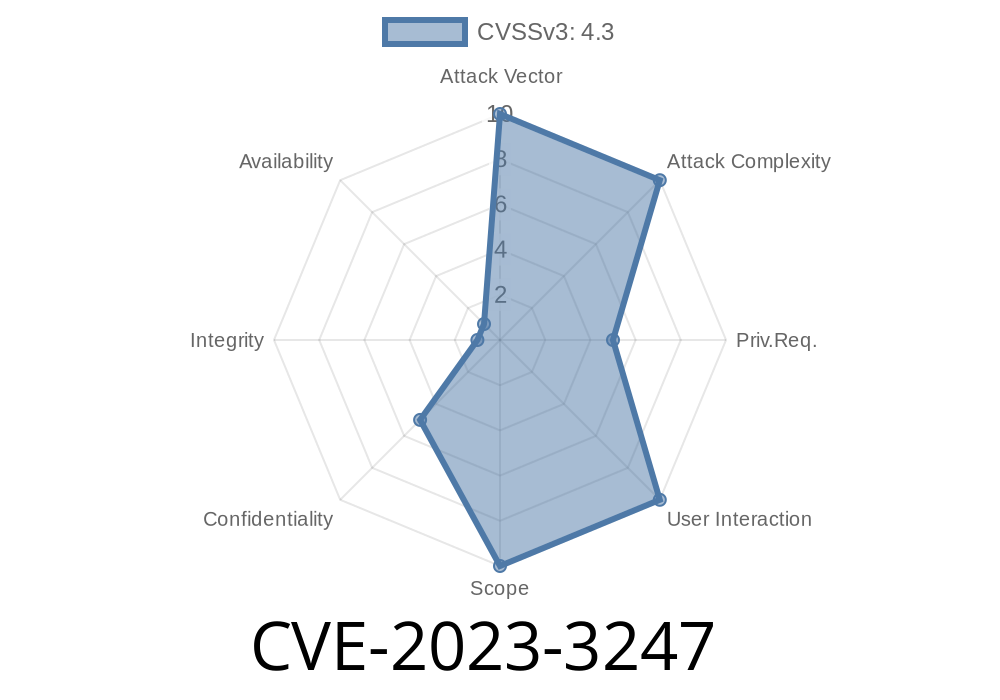PHP is everywhere—on millions of websites, APIs, and applications around the globe. But even the most popular platforms can have subtle, hidden vulnerabilities. Today, we’re digging into CVE-2023-3247, a security issue affecting PHP's SOAP extension in multiple 8.x versions. This bug not only leaks a chunk of uninitialized memory from the PHP client to any SOAP server, but also makes it much easier for a malicious server to guess authentication "nonces"—potentially manipulating or impersonating clients.
Let’s break down what this means, how it can affect you, and even look at code snippets that demonstrate the problem. If you need to patch your systems or explain the risk to your team, this is the exclusive read you want.
What is CVE-2023-3247?
CVE-2023-3247 is a vulnerability in PHP when using SOAP with HTTP Digest Authentication. The issue was present in:
PHP 8.2.* before 8.2.7
In simple terms: when your PHP code uses SOAP with digest authentication, and PHP internally creates a random "nonce" for authentication, it:
What Is A Nonce and Why Does It Matter?
A nonce (number used once) is an unpredictable value PHP generates to ensure that each HTTP Digest Authentication request is unique. This protects you against replay attacks.
If a malicious server can guess or predict the client’s nonce, it can compromise your authentication. If the server receives uninitialized memory, it might also collect sensitive dаta from your environment.
Where’s The Problem in Code?
When the PHP SOAP client uses Digest Auth, it should create a random value securely and send it as a "cnonce" (client-nonce) within the request.
But in affected PHP versions, the random value generation is written roughly like this (pseudocode for clarity):
function generateCNonce() {
$rnd = ;
$success = false;
// Use a random number generator
$rnd = php_random_int(&success); // not the real name, for demo
if ($success !== true) {
// Bug: Doesn't check for failure properly or fill memory!
// $rnd might be uninitialized memory here
}
// string(8) random value for cnonce, should be 64-bit, but only 31 bits used
$cnonce = sprintf("%08x", $rnd & x7FFFFFFF);
return $cnonce;
}
The Two Main Issues
1. Uninitialized Memory Disclosure: If PHP’s random generator fails, it returns undefined data—whatever happened to be in memory. That means you're accidentally leaking part of PHP's memory to the remote SOAP server.
2. Weak Nonce Generation: Instead of using full-strength randomness for the cnonce (should be 64 bits!), PHP only used up to x7FFFFFFF aka 31 bits—easier to predict or brute-force.
Demonstration: Leaking Uninitialized Memory
Let’s create a simplified example showing how uninitialized data could be sent.
Suppose a malicious or buggy PHP setup returns "fail" from the random generator
function my_soap_digest_nonce() {
// Intentionally emulate a failed PRNG
if (random_int_failure()) {
// $random may contain data left in memory!
$random; // Not set!
return sprintf("%08x", $random & x7FFFFFFF);
}
}
In the affected version, this value is sent in the HTTP header, e.g.
Authorization: Digest ... cnonce="deadbeef"
But if $random was uninitialized, it could be anything: fragments of other variables, secrets, even partial session data.
Exploit Scenario
Step 1: Attacker sets up a malicious SOAP server
Step 2: PHP SOAP client (using Digest Auth) connects
Step 3: Under some conditions (PRNG failure), client sends a cnonce containing leaked memory
Step 4: Server receives and extracts the leaked value
Even without a PRNG failure, the nonce range is just 31 bits—around 2 billion possible values, much less than the intended 64-bit (over 18 *quintillion*).
A determined attacker could simply brute-force all possible cnonces, making replay or spoofing attacks much more feasible.
Real-World Risks
- Leaked Information: While 31 bits isn't a huge leak, in a cloud or shared hosting setup, even small memory leaks could be dangerous—session identifiers, partial secrets, or other application data could slip through.
- Weakened security: Malicious servers can now guess your cnonce much more easily, undermining the very purpose of Digest Authentication.
8.2.7
Upgrade now! Just update PHP to a fixed version and you’ll be set.
References and Further Reading
- PHP Official Changelog for 8.1.20
- NVD CVE Entry
- PHP Commit Fix
Summary Table
| PHP Version | Patched In | Vulnerable? |
|-----------------|--------------|-------------|
| 8..* | 8..29 | YES |
| 8.1.* | 8.1.20 | YES |
| 8.2.* | 8.2.7 | YES |
| 8..29+ | | NO |
| 8.1.20+ | | NO |
| 8.2.7+ | | NO |
Final Advice
If you’re using PHP with SOAP and Digest Auth, you must upgrade past this vulnerability—especially if you connect to third-party SOAP services (where you can’t trust the server).
Conclusion
CVE-2023-3247 is a neat example of how minor bugs in random number generation can have knock-on effects: leaking unpredictable, possibly sensitive information AND making authentication schemes weaker. In modern web security, every bit—and every bug—counts!
Stay safe, stay patched! And if you want more details, check the references or share this post with your tech team.
*Original reporting, summarized and clarified for better understanding. Please consult linked resources for everything up to the minute.*
Timeline
Published on: 07/22/2023 05:15:00 UTC
Last modified on: 08/01/2023 16:38:00 UTC
